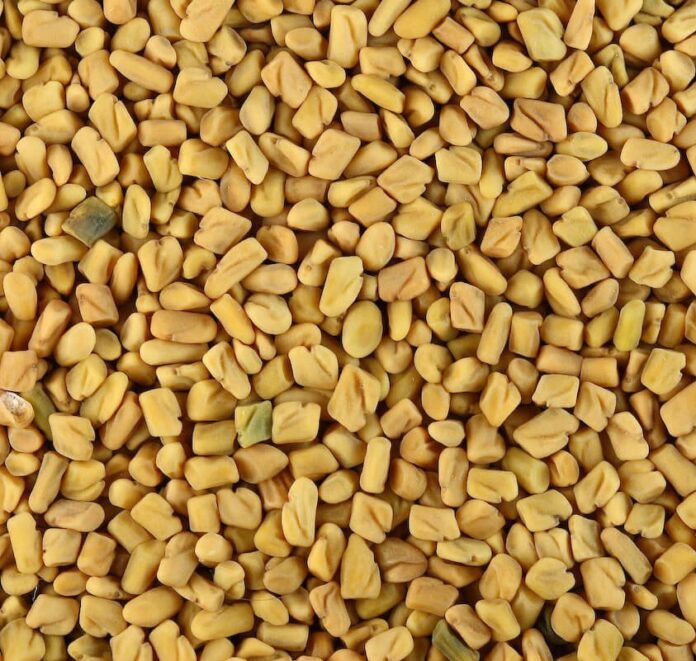
Introduction
Fenugreek seeds, known as Methi ke Beej in Hindi, are small, golden-brown seeds that are widely used in traditional medicine and culinary dishes. Fenugreek (Trigonella foenum-graecum) is a plant native to the Mediterranean region, and its seeds are known for their medicinal properties, nutritional value, and aromatic flavor.
Forms of Fenugreek
Fenugreek seeds can be consumed in several forms, depending on the intended use:
- Whole Seeds: These are the dried seeds that can be used as a spice in cooking, in teas, or for medicinal purposes.
- Ground Powder: Fenugreek seeds can be ground into a fine powder, making it easier to incorporate into dishes or take in capsule form for medicinal benefits.
- Fenugreek Tea: Fenugreek seeds can be boiled to make a tea, which is often used for its soothing properties.
- Fenugreek Oil: Extracted from the seeds, fenugreek oil is used in topical applications for skin and hair health.
- Fenugreek Supplements: These are available in the form of capsules or tablets, offering concentrated doses of the seeds’ active compounds.
- Sprouts: Fenugreek seeds can be sprouted, and the young leaves or sprouts are consumed as a salad or added to various dishes for a fresh flavor.
Health Benefits of Fenugreek

- Boosts Digestion: Fenugreek is rich in soluble fiber, which aids digestion, relieves constipation, and helps regulate bowel movements. It can also soothe the digestive tract and alleviate symptoms like indigestion and bloating.
- Improves Blood Sugar Control: Fenugreek seeds are known to help regulate blood sugar levels, making them beneficial for people with diabetes. The seeds contain compounds that can improve insulin sensitivity and slow down the absorption of sugars from the digestive tract.
- Supports Heart Health: The high fiber and antioxidant content of fenugreek may help reduce cholesterol levels, lower blood pressure, and improve overall heart health. It is believed to reduce the risk of heart disease.
- Promotes Breast Milk Production: Fenugreek is commonly used by breastfeeding mothers to stimulate milk production. It has been shown to increase milk supply due to its galactagogue properties.
- Anti-Inflammatory and Antioxidant Properties: The seeds are rich in antioxidants and anti-inflammatory compounds that help protect the body from oxidative stress and inflammation. This can improve immune function and reduce the risk of chronic diseases.
- Aids in Weight Loss: Fenugreek seeds can help with weight loss by promoting a feeling of fullness and reducing appetite. The high fiber content helps keep you satisfied for longer periods, reducing overall calorie intake.
- Improves Skin Health: Fenugreek has long been used to treat various skin conditions like acne, eczema, and psoriasis. The seeds’ anti-inflammatory properties help calm irritated skin, while their antioxidant content promotes healthy skin and reduces wrinkles.
- Hair Growth: Fenugreek is commonly used to prevent hair loss and promote hair growth. The seeds contain compounds that can improve scalp health, strengthen hair follicles, and increase circulation to the scalp.
- Hormonal Balance: Fenugreek seeds contain phytoestrogens, which can help balance hormones in both men and women. It is particularly beneficial for women experiencing menopause symptoms.
Side Effects of Fenugreek
Despite its many health benefits, fenugreek seeds should be consumed with caution, as they can cause certain side effects:

- Digestive Issues: In some people, consuming large quantities of fenugreek may cause digestive issues like bloating, gas, and diarrhea.
- Allergic Reactions: Some individuals may be allergic to fenugreek, leading to skin rashes, swelling, or difficulty breathing. If you experience any allergic reactions, it’s essential to seek medical attention immediately.
- Blood Sugar Levels: While fenugreek can help regulate blood sugar, it may cause hypoglycemia (low blood sugar) in some people, especially those on medication for diabetes. It’s important to monitor blood sugar levels closely when taking fenugreek.
- Interaction with Medications: Fenugreek may interact with certain medications, such as blood thinners (like warfarin) or medications for diabetes, potentially enhancing or diminishing their effects. Always consult a healthcare provider before using fenugreek supplements, especially if you’re on medication.
- Pregnancy: Pregnant women should exercise caution when consuming fenugreek, as it may stimulate uterine contractions. It’s recommended to avoid large amounts of fenugreek during pregnancy unless directed by a healthcare professional.
- Body Odor: One common side effect of fenugreek is a maple syrup-like odor in sweat and urine, due to the presence of a compound called sotolon. While not harmful, it can be unpleasant.
This Article is for Basic Information. Contact a professional doctor before using it.
HAKEEM KARAMAT ULLAH
+923090560000




